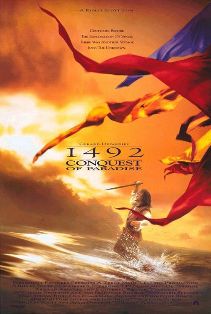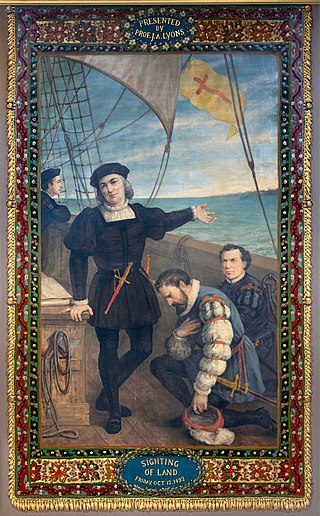
Christopher Columbus was an Italian explorer and navigator from the Republic of Genoa who completed four Spanish-based voyages across the Atlantic Ocean sponsored by the Catholic Monarchs, opening the way for the widespread European exploration and colonization of the Americas. His expeditions were the first known European contact with the Caribbean and Central and South America.

Columbus Day is a national holiday in many countries of the Americas and elsewhere, and a federal holiday in the United States, which officially celebrates the anniversary of Christopher Columbus's arrival in the Americas. He went ashore at Guanahaní, an island in the Bahamas, on October 12, 1492 [OS]. On his return in 1493, he moved his coastal base of operations 70 miles east to the island of Hispaniola, what is now the Dominican Republic and established the settlement of La Isabela, the first permanent Spanish settlement in the Americas.

Gloria Jean Watkins, better known by her pen name bell hooks, was an American author, theorist, educator, and social critic who was a Distinguished Professor in Residence at Berea College. She was best known for her writings on race, feminism, and class. She used the lower-case spelling of her name to decenter herself and draw attention to her work instead. The focus of hooks' writing was to explore the intersectionality of race, capitalism, and gender, and what she described as their ability to produce and perpetuate systems of oppression and class domination. She published around 40 books, including works that ranged from essays, poetry, and children's books. She published numerous scholarly articles, appeared in documentary films, and participated in public lectures. Her work addressed love, race, social class, gender, art, history, sexuality, mass media, and feminism.

1492: Conquest of Paradise is a 1992 epic historical drama film directed and produced by Ridley Scott, written by Roselyne Bosch and starring Gérard Depardieu, Armand Assante, and Sigourney Weaver. It portrays a version of the travels to the New World by the Italian explorer Christopher Columbus and the effect this had on indigenous peoples.
Arab Jews is a term for Jews living in or originating from the Arab world. Many left or were expelled from Arab countries in the decades following the founding of Israel in 1948, and took up residence in Israel, Western Europe, the United States and Latin America. The term is controversial and politically contested in Israel, where the term "Mizrahi Jews" was adopted by the early state instead. However, some anti-Zionist Jews of Arab origin actively elect to call themselves Arab Jews.

The Seville Expo '92 was a universal exposition that took place from Monday, April 20 to Monday, October 12, 1992, on La Isla de La Cartuja, Seville, Spain. The theme for the expo was "The Age of Discovery", celebrating the 500th anniversary of Christopher Columbus reaching the Americas after launching from Seville's port, and over 100 countries were represented. The total amount of land used for the expo was 215 hectares and the total number of visitors was 41,814,571. The exposition ran at the same time as the smaller and shorter-duration Genoa Expo '92, a Specialized Exhibition, held in memory of Christopher Columbus, born in Genoa.

The Universal Monsters media franchise includes characters based on a series of horror films produced by Universal Pictures and released between 1913–1956.

Christopher Columbus: The Discovery is a 1992 historical adventure film directed by John Glen. It was the last project developed by the father and son production team of Alexander and Ilya Salkind. The film follows events after the fall of the Emirate of Granada, and leads up to the voyage of Columbus to the New World in 1492.
Robert Stam is an American film theorist working on film semiotics. He is a professor at New York University, where he teaches about the French New Wave filmmakers. Stam has published widely on French literature, comparative literature, and on film topics such as film history and film theory. Together with Ella Shohat, he co-authored Unthinking Eurocentrism: Multiculturalism and the Media.
Ella Habiba Shohat is an Iraqi-born Israeli-American professor of cultural studies at New York University, where she teaches in the departments of Art & Public Policy and Middle Eastern & Islamic Studies. She has written and lectured on the topics of Eurocentrism, orientalism, post-colonialism, trans-nationalism, diasporic cultures, and Iraqi-Jewish culture.

An ethnographic film is a non-fiction film, often similar to a documentary film, historically shot by Western filmmakers and dealing with non-Western people, and sometimes associated with anthropology. Definitions of the term are not definitive. Some academics claim it is more documentary, less anthropology, while others think it rests somewhere between the fields of anthropology and documentary films.

The Magic Voyage is a 1992 German animated fantasy film produced and directed by Michael Schoemann. It was released in Germany by Atlas Film on 14 February 1992. The film was later dubbed in English and released in the United States and Canada: two English dubs were actually produced. The first one was a rare English dub released by Atlas Film, while the second English dub was produced by Hemdale Film Corporation, released as The Magic Voyage on 23 April 1993 with a new and more well-known voice cast. The latter dub had a different music soundtrack, and both English dubs had different translations.
Goat Island was a collaborative performance group based in Chicago, Illinois and founded in 1987. They toured internationally and made nine performance works before disbanding. In 2006 they announced The Lastmaker (2007) would be the last work that they would create as a company, and the final performances were held at Swain Hall, University of North Carolina, Chapel Hill, in February 2009.
The presence of African Americans in major motion picture roles has stirred controversy and been limited dating back decades due to lingering racism following slavery and segregation. "Through most of the 20th century, images of African-Americans in advertising were mainly limited to servants like the pancake-mammy Aunt Jemima and Rastus, the chef on the Cream of Wheat box." While African American representation in the film industry has improved over the years, it has not been a linear process; "Race in American cinema has rarely been a matter of simple step-by-step progress. It has more often proceeded in fits and starts, with backlashes coming on the heels of breakthroughs, and periods of intense argument followed by uncomfortable silence."
Christopher Columbus was an Italian explorer and navigator who completed four voyages across the Atlantic Ocean, opening the way for European exploration and colonization of the Americas. His expeditions, sponsored by the Catholic Monarchs of Spain, were the first European contact with the Caribbean, Central America, and South America. He has been represented in many fictional and semi-fictional works, including plays, operas, films and TV, as well as literary works.

Karl Weber was an actor in the era of old-time radio.

The Columbus Murals are a series of twelve murals depicting Christopher Columbus, painted in the 1880s by Luigi Gregori and displayed in the Main Building at the University of Notre Dame in Indiana, US. The murals have been a source of controversy in recent decades for their romanticized portrayal of Columbus and his relationship with Native Americans.

Talitha Espiritu is a Filipino author and academic known for her work on cinema during the Marcos dictatorship. Espiritu teaches in the Film and New Media Studies program at Wheaton College in Norton, Massachusetts.

The Columbus Quincentenary (1992) was the 500th anniversary of Christopher Columbus' 1492 arrival in America. Similar to Columbus Day, the annual celebration of Columbus' arrival, the quincentenary was viewed contentiously, as different cultures and peoples had different ways of understanding Columbus' role in history. Certain institutions sought to celebrate this anniversary in commemoration of Columbus' momentous colonial and imperial achievements. Spain's Universal Exposition of Seville (1992) was elaborately planned to highlight Columbus' work and the overall European Age of Discovery. Italy's International Exposition of Genoa (1992) was themed "Christopher Columbus, The Ship and the Sea." In 1984, the United States designated the Christopher Columbus Quincentenary Jubilee Commission to execute a commemoration in honor of Columbus. In total, over 20 countries, including several Latin American countries and Japan, had committees to plan quincentennial celebrations.
Robbie Leppzer is an American filmmaker and videographer known for directing documentary films about grassroots activism. He is the owner of the production company Turning Tide Productions. Works directed or co-directed by Leppzer include Seabrook 1977 (1978), Harvest of Peace (1985), Columbus Didn't Discover Us (1992), An Act of Conscience (1997), The Peace Patriots (2005), and Power Struggle (2016).













